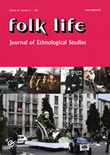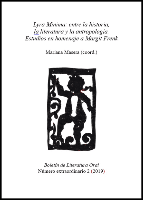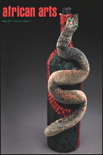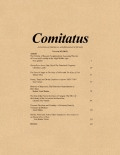
Folklor/Edebiyat-Folklore/Literature
metrics 2024
Illuminating Heritage: A Scholarly Journey into Folklore and Literature
Introduction
Folklor/Edebiyat-Folklore/Literature is an esteemed interdisciplinary journal dedicated to the exploration of folklore and literature, published by Rector CIU Cyprus International University. Established as a crucial platform for scholarly discourse, it has been an Open Access journal since 2015, empowering researchers and students from around the globe to share their findings without barriers. With its ISSN 1300-7491 and E-ISSN 2791-6057, the journal aims to bridge the gap between Anthropology, Cultural Studies, and History, as reflected in its commendable ranking in the 2023 Category Quartiles, where it holds Q3 in Anthropology and Q2 in both Cultural Studies and History. The journal is essential for anyone looking to deepen their understanding of folkloric narratives and their literary implications, contributing significantly to ongoing dialogues in these vibrant fields of study. Set in the culturally rich context of Cyprus, and operating within a converged time frame from 2018 to 2024, Folklor/Edebiyat serves as a dynamic resource for researchers, professionals, and students alike, providing access to a diverse range of scholarly articles that inspire new interpretations and discussions.
Metrics 2024
 -
- 0.10
0.10 -
- -
-Metrics History
Rank 2024
Scopus
JCI (Web Of Science)
Quartile History
Similar Journals

VOLKSKUNDE
Advancing Knowledge in Ethnographic ResearchVOLKSKUNDE is a distinguished academic journal dedicated to the study of folklore and cultural traditions, published by CENTRUM STUDIE DOCUMENTATIE based in Belgium. With an ISSN of 0042-8523, this journal serves as an essential platform for researchers, scholars, and students interested in the rich tapestry of cultural heritage and ethnographic research. Although currently not available as an open-access publication, VOLKSKUNDE is committed to disseminating high-quality scholarly articles that provide critical insights into the complexities of cultural practices across diverse societies. The journal’s objective is to foster academic discourse and stimulate inquiry into folklore studies, promoting a deeper understanding of cultural dynamics. By engaging with a broad range of topics within its scope, VOLKSKUNDE is an invaluable resource for anyone looking to deepen their knowledge in the field of folkloristics.

Slovensky Narodopis-Slovak Ethnology
Discovering the Essence of Slovak IdentitySlovensky Narodopis-Slovak Ethnology is a leading academic journal dedicated to the exploration of ethnology and cultural studies, published by the Slovak Academy of Sciences at the Institute of Ethnology. With an Open Access policy since 2013, it strives to make high-quality research readily accessible to a global audience, enhancing the dialogue around Slovak cultural heritage and broader anthropological topics. The journal holds a notable position in the field, currently ranked Q2 in anthropology for 2023, indicating its substantial contribution to the discipline. It is indexed in Scopus, with a current rank of 245 out of 502 in the Social Sciences category, reflecting its value within the academic community. Researchers and students alike can look forward to a rich array of original research articles, reviews, and essays that not only delve into Slovak ethnology but also engage with international perspectives, thereby enriching the understanding of cultural dynamics and practices.

Folk Life-Journal of Ethnological Studies
Fostering Interdisciplinary Dialogue in Ethnological Research.Welcome to the Folk Life-Journal of Ethnological Studies, a distinguished publication devoted to exploring the rich tapestry of human culture and ethnological research. Published by Routledge Journals, Taylor & Francis Ltd, this journal serves as an essential platform for scholars and practitioners within the fields of Anthropology, Arts and Humanities, and Cultural Studies. With a publication history stretching back to 1963, the journal has become a valuable resource for disseminating innovative and interdisciplinary research, contributing to a deeper understanding of diverse cultural phenomena. Despite its current quartile rankings of Q4 across multiple categories, 'Folk Life' continues to strive for academic excellence and encourages submissions that challenge existing narratives and offer fresh perspectives. Although not open access, articles published in this journal are rigorously peer-reviewed, ensuring the highest scholarly standards. Researchers, professionals, and students alike will find rigorous and thought-provoking studies within its pages, making Folk Life an important fixture in the academic landscape.

Folklore-Electronic Journal of Folklore
Celebrating the Diversity of Human Expression in FolkloreFolklore-Electronic Journal of Folklore is a pioneering academic platform dedicated to the expansive field of folklore studies, published by the esteemed Estonian Literary Museum. With an ISSN of 1406-0957 and an E-ISSN of 1406-0949, this journal has established itself as a notable contributor to the scholarship on cultural expressions and traditions, particularly in the context of Estonia and beyond. Operating under an open access model, the journal aims to disseminate high-quality research that illuminates the rich tapestry of human folklore, mythology, and cultural practices across various societies. Recognized for its impact, it has been categorized in the Q3 quartile for Anthropology and Q2 for Cultural Studies in 2023, reflecting its relevance and rigorous academic standards. By ranking #436 out of 1304 in Cultural Studies and #267 out of 502 in Anthropology according to Scopus, the journal serves as a vital resource for researchers, professionals, and students interested in the interplay between folklore and contemporary societal issues. Overall, the Folklore-Electronic Journal of Folklore not only promotes scholarly exchange but also invites contributions that push the boundaries of traditional folklore research.

Revista de Etnografie si Folclor-Journal of Ethnography and Folklore
Unraveling the Threads of Ethnographic KnowledgeRevista de Etnografie si Folclor-Journal of Ethnography and Folklore, an esteemed publication by EDITURA ACAD ROMANE, serves as a vital platform for the dissemination of research and scholarship in the fields of anthropology and cultural studies. Established in Romania, this journal has committed itself to exploring the rich tapestry of ethnographic practices and folklore traditions, favoring interdisciplinary approaches that illuminate the diverse cultural heritage of societies. With an ISSN of 0034-8198, the journal has been instrumental in fostering academic dialogue and engaging researchers, professionals, and students alike. Though currently classified in the Q4 category of both anthropology and cultural studies, its continued growth from 2014 to 2024 signals an evolving contribution to understanding cultural dynamics. Accessible via traditional publication means, the journal encourages contributions that deepen the understanding of ethnographic methodologies and cultural narratives, thereby enriching the academic landscape.

Heranca-Revista de Historia Patrimonio e Cultura
Bridging Theory and Practice in Heritage StudiesHerança - Revista de História, Patrimonio e Cultura is a distinguished academic journal published by Ponteditora in Portugal, dedicated to the exploration and preservation of history, heritage, and culture. Since its inception in 2018, this open-access journal has established a strong foothold in the academic community, becoming a valuable resource for researchers, professionals, and students alike. With an impressive presence in the Scopus rankings—ranking Q3 in multiple categories such as *Arts and Humanities (Miscellaneous)* and *Cultural Studies*—the journal demonstrates its commitment to advancing interdisciplinary dialogue and fostering innovation in the humanities. By offering unrestricted access to its rich array of scholarly articles, Herança plays a vital role in disseminating knowledge and promoting further research in the fields of history, museology, and the arts. With an aim to bridge theoretical insights and practical applications, this journal stands as an essential contributor to the cultural landscape and heritage studies, making it a pivotal platform for contemporary issues in our understanding of cultural identity and heritage conservation.

Boletin de Literatura Oral
Bridging Disciplines Through the Study of Oral NarrativesBoletin de Literatura Oral is an esteemed academic journal published by UNIV JAEN, SERV PUBLICACIONES, dedicated to advancing the fields of Anthropology, History, Linguistics, and Literary Theory. With its Open Access model established in 2011, the journal ensures that valuable research reaches a global audience without financial barriers. Based in Spain, at the CAMPUS LAGUNILLAS in Jaen, this publication has been recognized for its rigorous scholarship, achieving a Q4 ranking in Anthropology and notable Q3 and Q2 rankings in related disciplines as of 2023. The journal thrives on its commitment to fostering interdisciplinary dialogue, serving as a vital resource for researchers, professionals, and students keen on exploring the rich tapestry of oral literature and its implications across cultures. The journal is indexed in major databases, underscoring its relevance and accessibility in the research community.

OSTERREICHISCHE ZEITSCHRIFT FUR VOLKSKUNDE
Documenting the Tapestry of Austrian TraditionsOSTERREICHISCHE ZEITSCHRIFT FUR VOLKSKUNDE is a dedicated academic journal published by the VEREIN FUR VOLKSKUNDE that focuses on the interdisciplinary study of folklore and ethnology, particularly in the Austrian context. With a long-standing history of contributing to cultural studies, this journal serves as an essential resource for researchers, professionals, and students interested in the nuances of social practices, traditions, and cultural narratives. Although it has ceased its indexing in Scopus as of 2019, its impact is reflected in its rankings, particularly in the categories of Social Sciences and Arts and Humanities, making it a crucial reference point for those studying cultural phenomena. The journal, with ISSN 0029-9669, is based in Vienna, Austria, and offers a rich compendium of articles that promote scholarly discourse and broaden understanding in the field of Volkskunde. As it continues to foster academic dialogue, OSTERREICHISCHE ZEITSCHRIFT FUR VOLKSKUNDE remains a notable contributor to the evolution of cultural studies in the region and beyond.

AFRICAN ARTS
Documenting the Dynamic Landscape of African ArtsAFRICAN ARTS is a distinguished journal published by MIT PRESS, focusing on the vibrant intersections of literature, visual arts, and performing arts within the African context. Boasting an ISSN of 0001-9933 and an E-ISSN of 1937-2108, this journal serves as a critical platform for scholars and practitioners worldwide to explore and disseminate their research on African artistic expressions. With a solid impact represented by its Q3 rankings in both Literature and Literary Theory and Visual Arts and Performing Arts as of 2023, it ranks in the top 20% within the literature category and in the top 30% for visual arts. AFRICAN ARTS aims to foster a deeper understanding of the cultural, historical, and social contexts that shape these disciplines, embracing a wide array of methodologies and theoretical frameworks. Though not an open-access journal, it provides valuable insights and analysis that contribute significantly to the global discourse surrounding African arts, making it a vital resource for researchers, professionals, and students alike.

COMITATUS-A JOURNAL OF MEDIEVAL AND RENAISSANCE STUDIES
Illuminating the Complexities of Cultural HeritageCOMITATUS: A Journal of Medieval and Renaissance Studies, published by the University of California Center for Medieval and Renaissance Studies, serves as a critical platform for exploring the complexities of medieval and Renaissance eras through diverse scholarly lenses. With an ISSN of 0069-6412 and a dedicated E-ISSN of 1557-0290, this journal operates primarily in the United States, delivering rigorous academic discourse aimed at historians, literary critics, and art scholars alike. Although currently classified in the Q4 category within its fields in 2023, including History, Literature and Literary Theory, and Visual Arts and Performing Arts, COMITATUS invites submissions that challenge prevailing narratives and introduce innovative perspectives on cultural phenomena. It has been publishing since 2002 with periods of convergence spanning from 2002 to 2009, and from 2017 to 2023. The journal's commitment to open dialogue and research dissemination makes it an essential resource for students, professionals, and researchers interested in medieval and Renaissance studies, fostering a deeper understanding of these pivotal historical periods.